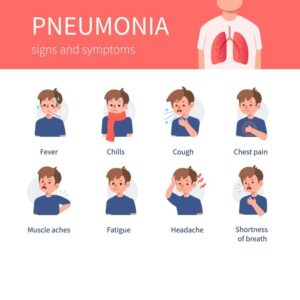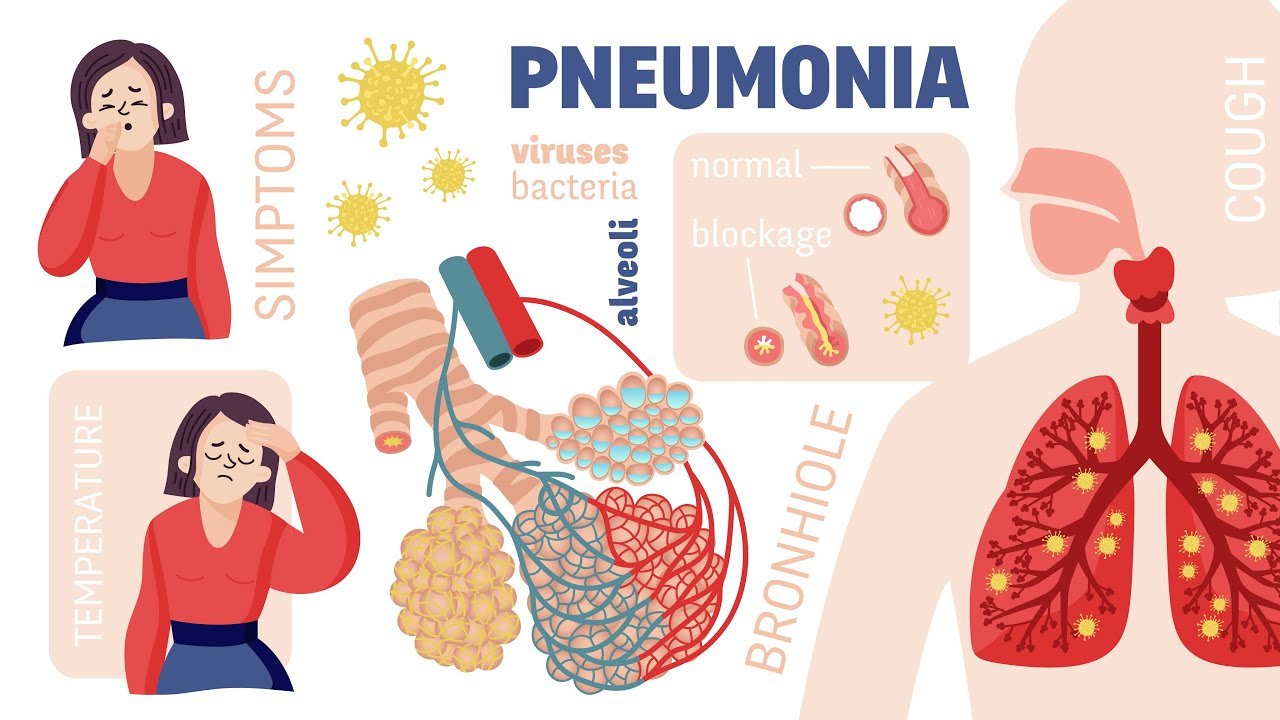Pneumonia is a significant health concern, especially among young children, and viral pneumonia is one of the leading causes of pediatric hospital admissions. Unlike bacterial pneumonia, typically treated with antibiotics, viral pneumonia can be more challenging to treat with conventional methods, as it doesn’t always respond to antibiotics. For this reason, many parents seek alternative or complementary treatment options such as homeopathy to help manage viral pneumonia in children.
In this article, we will delve into the causes, symptoms, and treatment of viral pneumonia in children. We will also examine how homeopathy can offer a supportive and holistic approach to care.
What is Viral Pneumonia?
Pneumonia is an infection that causes inflammation in the air sacs of the lungs. When these air sacs become inflamed due to infection, they can fill with fluid or pus, causing symptoms such as cough, fever, and difficulty breathing. Viral pneumonia, in particular, is caused by several types of viruses, including:
- Respiratory Syncytial Virus (RSV): This is the most common cause of viral pneumonia in infants and young children.
- Influenza Virus: The flu virus can lead to pneumonia, especially when the child’s immune system is weakened.
- Adenovirus: Often associated with respiratory illnesses, this virus can lead to pneumonia in children.
- Coronaviruses: Including the novel coronavirus (SARS-CoV-2), which caused the global pandemic.
- Parainfluenza Virus: Another virus that can cause pneumonia, particularly in children under 5.
Symptoms of Viral Pneumonia in Children
Viral pneumonia often presents with symptoms that can range from mild to severe. Common symptoms include:

- Cough: A dry or productive cough that may worsen over time.
- Fever: A high fever is often seen in viral pneumonia and can fluctuate throughout the illness.
- Shortness of Breath: Difficulty breathing, rapid breathing, or shallow breaths can occur due to inflammation in the lungs.
- Wheezing: The child may make a whistling sound when breathing, which is characteristic of inflammation in the airways.
- Fatigue and Lethargy: Children may appear unusually tired and may experience difficulty in staying active or eating.
- Chest Pain: In some cases, children may experience discomfort or pain in the chest, particularly when breathing deeply or coughing.
- Dehydration: Due to fever, increased respiratory rate, and decreased appetite, children may show signs of dehydration such as dry mouth, sunken eyes, or reduced urine output.
Causes and Risk Factors
The cause of viral pneumonia is typically exposure to respiratory viruses. Children are particularly vulnerable because their immune systems are still developing. Risk factors include:
- Age: Children under 2 years of age are at a higher risk, as their immune systems are less mature.
- Prematurity: Premature babies often have underdeveloped lungs, making them more susceptible to respiratory infections.
- Underlying Health Conditions: Children with preexisting conditions such as asthma, cystic fibrosis, or heart disease are at higher risk for complications.
- Exposure to Viruses: Close contact with infected individuals, such as in daycare settings, increases the risk of viral infections.
- Weakened Immune System: Children with a compromised immune system due to conditions like HIV or leukemia are more prone to developing severe pneumonia.
Conventional Treatment for Viral Pneumonia
The treatment for viral pneumonia primarily focuses on relieving symptoms and supporting the immune system. Unlike bacterial pneumonia, viral pneumonia does not benefit from antibiotics. The main treatments include:
- Antiviral Medications: For certain viruses like influenza, antiviral medications may be prescribed.
- Fever Reducers: Over-the-counter medications like acetaminophen or ibuprofen can help reduce fever and discomfort.
- Hydration: Ensuring the child stays hydrated is crucial, particularly when they are experiencing fever and reduced appetite.
- Oxygen Therapy: In severe cases, especially when breathing difficulties are significant, oxygen may be administered.
- Rest: Plenty of rest is essential for recovery and to help the immune system fight off the virus.
How Homeopathy Can Help in Treating Viral Pneumonia in Children
Homeopathy offers a gentle, holistic approach to managing viral pneumonia in children by treating the root cause of illness, boosting the immune system, and reducing symptoms. Homeopathic remedies are highly individualized, which means they take into account the child’s specific symptoms, temperament, and overall health.
Key Homeopathic Remedies for Viral Pneumonia in Children:
- Aconite: Often used at the onset of illness, especially when pneumonia begins after exposure to cold or fright. Symptoms include fever, restlessness, and dry cough.
- Bryonia: Indicated when the child has a dry, painful cough, with a worsening of symptoms from movement. This remedy may be useful for pneumonia with chest pain and a thirst for large amounts of water.
- Phosphorus: Recommended when the child experiences a deep, hoarse cough, often with wheezing and difficulty breathing. The child may feel better in open air and may have a strong desire for cold drinks.
- Spongia: Useful for dry, barking coughs and labored breathing. This remedy is often used when the cough is harsh and there is a feeling of constriction in the chest.
- Antimonium tartaricum: Indicated when there is a rattling cough with difficulty in expectoration (coughing up mucus). The child may appear weak and fatigued.
- Kali bichromicum: Ideal for cases with thick, stringy mucus that is difficult to cough up, along with a frequent, productive cough.
How Homeopathy Works:
Homeopathy focuses on the principle of “like cures like,” meaning that a substance that causes symptoms in a healthy person can be used in very small amounts to treat those same symptoms in a sick person. By stimulating the body’s natural healing mechanisms, homeopathy helps restore balance and promotes recovery.
In treating viral pneumonia in children, homeopathic remedies not only help alleviate symptoms like fever, cough, and difficulty breathing but also strengthen the immune system to fight off the viral infection. Additionally, homeopathy helps reduce inflammation, improves respiratory function, and accelerates recovery without the side effects commonly associated with conventional treatments.
Benefits of Homeopathy for Viral Pneumonia:
- Non-Toxic: Homeopathic remedies are safe, non-toxic, and free from side effects, making them ideal for treating children.
- Holistic Approach: Homeopathy treats the child as a whole, taking into account physical, emotional, and mental health, providing a comprehensive treatment.
- Supports Immune Function: Homeopathy strengthens the immune system, allowing the child’s body to fight off the infection naturally.
- Reduces Symptoms: Homeopathic remedies can help alleviate cough, fever, chest pain, and breathing difficulties.
- Prevents Recurrence: Homeopathic treatment not only addresses the current illness but also helps prevent future respiratory infections by enhancing overall immunity.
Conclusion:
Viral pneumonia in children can be a serious condition, requiring prompt attention and care. Conventional treatments focus on managing symptoms, but homeopathy offers a holistic and natural approach that complements these methods, helping the body recover faster and with fewer side effects. If your child is suffering from viral pneumonia, it’s crucial to consult with a qualified homeopathic practitioner who can provide individualized remedies based on your child’s unique symptoms and constitution.
By choosing homeopathy, you may find a safe, effective way to support your child through their recovery from viral pneumonia, improving their respiratory health and overall well-being.
